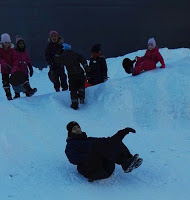In order to build positive relationships with students I have put forward the idea that it is not enough to just know your students but that they must also know you (Being Human part 1). Whilst allowing your students to see you as something more than a teacher might make some teachers feel uncomfortable, should it help foster positive relationships, then surely this is an avenue worth pursuing. Hattie's diagram below is a gentle reminder about the potential impact positive teacher student relationships can have on student achievement, with at least three of the factors in Hattie’s diagram related to the teacher student dynamic: teacher-student relationships; not labelling students & expectations.


An effect-size of 1.0 is typically associated with:
- Advancing learners' achievement by one year, or improving the rate of learning by 50%
- A two grade leap in GCSE, e.g. from a C to an A grade
- An effect size of 1.0 is clearly enormous! (It is defined as an increase of one standard deviation) 1
With the above in mind, below are a few more strategies you may wish to consider in an effort to show the students you are human.
i) Personal Anecdotes
- Anecdotes show that you are human, something more than a teacher.
- Anecdotes are a tool you can use successfully (sometimes) to make a point.
- Anecdotes help you avoid being a hypocrite. I think it is important that we model expectations.
- Anecdotes allow you to model the idea of reflection. I have rarely met a teacher who did not ascribe to the notion that schooling is about developing the whole child. Yet whilst modelling positive behaviour, modelling expected outcomes, and modelling language are all generally accepted norms/expectations in many classrooms. Modelling reflection (by a teacher) beyond the realm of school work is not common discourse in schools.
- Anecdotes sometimes enable students to be comfortable in sharing their thoughts and feelings about the themes, topics, issues covered in class. It helps build mutual trust, and helps you create open dialogue.
Example Anecdote
During my honeymoon my wife and I climbed Half Dome in California, We set off at 5 am and made it to the top at around 2 pm, we were back down by 7.15 pm. It is one of my most important memories from my honeymoon road trip around California. Important because I got so much wrong. I failed to pay attention to the experience of the journey, take in the scenery, talk to fellow walkers, and enjoy the company of my life companion. Instead I was only intent on achieving my goal of getting to the summit and back down again by nightfall. This is an anecdote I have used to remind students (and myself as a school leader) that completing work is not always about finding the right answer to a problem, it’s also about the journey taken. For example, students are sometimes so intent on finishing a piece of extended writing quickly they forget to consider all the ingredients necessary to produce a quality piece of work (slow writing). With regards to Maths, how often do students complete maths problems without showing their working out? And how often do we witness poor teamwork by students (and adults) in the pursuit of getting work completed quickly...
However, sharing personal anecdotes does come with a health warning. Be careful that the classroom does not become about you. This is simply a tool to ensure lessons are about them.
ii) The Playground
When on break and/or lunch duty get involved. Talk to students about what book they are reading, or if they have watched any movies lately, or what they think of Taylor Swift’s latest song, or squeeze. I would even suggest involving yourself in some of the playground activities such as hopscotch, skipping, basketball, football, table tennis, or even sledging/sledding:
Mr Mark Asker International School January 2015
iii) The Corridor
Smile and say 'Hi' to students on the corridor. Remember the journey to the staffroom or the classroom is just as important as reaching your final destination.
1 http://www.teacherstoolbox.co.uk/T_effect_sizes.html
This work is licensed under a Creative Commons Attribution-NonCommercial-NoDerivatives 4.0 International License
No comments:
Post a Comment